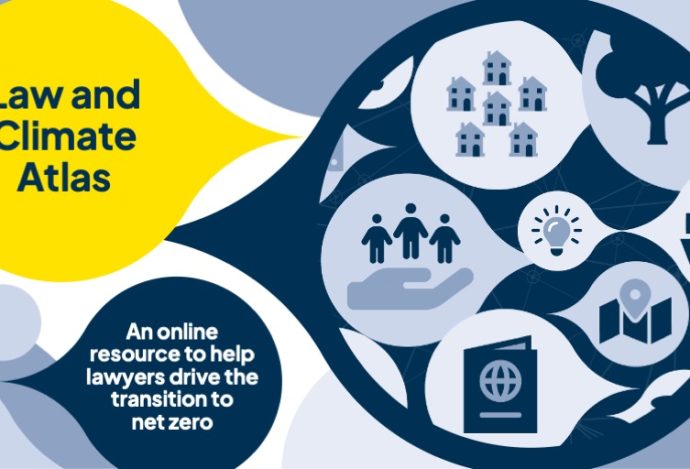New initiative by the Centre for Climate Engagement at Hughes Hall provides a valuable online resource to help lawyers drive transition to net zero.
Law has a key role to play in addressing climate change. The time-critical emergency and challenge presented by climate change require the full force of the entire body of available law. While many lawyers are aware of climate change, the issue is often siloed into specific practice areas. With this problem in mind, the Centre for Climate Engagement (CCE) has developed a Law and Climate Atlas mapping intersections between climate change and law to bring focus to how climate change impacts many different areas of law – and how each area and its lawyers can help to drive change.
The free-to-use Law and Climate Atlas, which is hosted on the CCE website, will support lawyers to help their clients navigate the net zero transition and enable lawyers to recognise how climate change is impacting their practice – including physical climate risks, emerging technologies, and new policy measures shaping legal frameworks. This will aid lawyers to better understand what they, and the organisations they represent, can do to optimise the potential of all law and regulation to drive climate action.

“Lawyers need to be aware that new climate laws and commitments are emerging and to know when to apply them. The CCE Law and Climate Atlas is an excellent tool for lawyers across different practice areas and will help them to identify how far climate change spreads across the scope of legal advice.”
“Some areas of law not traditionally thought of as climate law are relevant for climate action. Planning, contract and property law are all potential rich sources. Our Law and Climate Atlas will help lawyers working in these areas to understand what the climate risks are and advise clients accordingly. It will also show how they might utilise existing regulations to allow and support companies and other organisations to address climate change in a better way,” said Emily Farnworth, Director of CCE.
“Climate change cuts across all legal fields and needs to be addressed in every area of law and level. Law students are a key part of driving the change and the CCE Law and Climate Atlas provides a valuable resource that will enable students to understand how and where climate intersects with every area of law. It will, I hope, help students to develop a level of expertise to speak the language of science and the language of climate change in their daily legal studies and future practice,” said Dr Markus Gehring, Associate Professor and the Centre for European Legal Studies (CELS) expert and fellow of the Lauterpacht Centre and Hughes Hall, University of Cambridge.
“Lawyers need to be aware that new climate laws and commitments are emerging and to know when to apply them. The CCE Law and Climate Atlas is an excellent tool for lawyers across different practice areas and will help them to identify how far climate change spreads across the scope of legal advice. This knowledge and understanding will equip lawyers to enable clients to also be climate fluent,” said Wendy Miles KC, Barrister Twenty Essex.
In its first iteration, the CCE Law and Climate Atlas features UK domestic as well as international law and references many world-wide legal developments that may inform the direction of travel in the UK over the immediate, crucial years to come. The Atlas explains existing case law, legislation, and regulations relevant to climate change. The convening power of the CCE has secured expert insights to help develop the resource to highlight how the law might evolve in each area.
Summaries offer an informed overview of the key climate-related issues affecting each area of law, and the CCE Law and Climate Atlas cites and links to further reading and resources. As an online resource, the Atlas will be broadened in scope, revised and updated to reflect relevant changes over time to provide informed, trustful and insightful information. The CCE team will amend sections regularly in light of new legal developments and feedback from users.
The Law and Climate Atlas emerged from a CCE research project started earlier this year, and a number of law student interns from the University of Cambridge conducted much of the initial research. Legal experts from academia and practice reviewed sections of their expertise. Emily Farnworth said: “We are very grateful to the Net Zero Lawyers Alliance for helping us with this project, and to its members who reviewed many of the sections. We hope that the Law and Climate Atlas adds meaningfully to the tools at our disposal to accelerate the race to net zero emissions, and better equips lawyers to use their position to be agents of change.”
See the CCE Law and Climate Atlas here
For more on The Hughes Hall Centre for Climate Engagement see: climatehughes.org/about-us.
14.11.22





